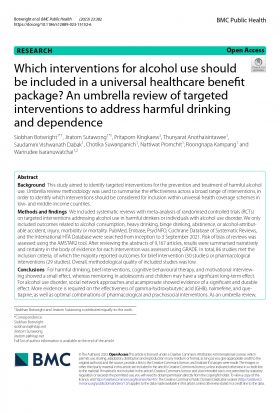This website uses cookies so that we can provide you with the best user experience possible. Cookie information is stored in your browser and performs functions such as recognising you when you return to our website and helping our team to understand which sections of the website you find most interesting and useful.
Which interventions for alcohol use should be included in a universal healthcare benefit package? An umbrella review of targeted interventions to address harmful drinking and dependence

รายละเอียดเพิ่มเติม
Abstract
Background
This study aimed to identify targeted interventions for the prevention and treatment of harmful alcohol use. Umbrella review methodology was used to summarise the effectiveness across a broad range of interventions, in order to identify which interventions should be considered for inclusion within universal health coverage schemes in low- and middle-income countries.
Methods and findings
We included systematic reviews with meta-analysis of randomised controlled trials (RCTs) on targeted interventions addressing alcohol use in harmful drinkers or individuals with alcohol use disorder. We only included outcomes related to alcohol consumption, heavy drinking, binge drinking, abstinence, or alcohol-attributable accident, injury, morbidity or mortality. PubMed, Embase, PsycINFO, Cochrane Database of Systematic Reviews, and the International HTA Database were searched from inception to 3 September 2021. Risk of bias of reviews was assessed using the AMSTAR2 tool. After reviewing the abstracts of 9,167 articles, results were summarised narratively and certainty in the body of evidence for each intervention was assessed using GRADE. In total, 86 studies met the inclusion criteria, of which the majority reported outcomes for brief intervention (30 studies) or pharmacological interventions (29 studies). Overall, methodological quality of included studies was low.
Conclusions
For harmful drinking, brief interventions, cognitive behavioural therapy, and motivational interviewing showed a small effect, whereas mentoring in adolescents and children may have a significant long-term effect. For alcohol use disorder, social network approaches and acamprosate showed evidence of a significant and durable effect. More evidence is required on the effectiveness of gamma-hydroxybutyric acid (GHB), nalmefene, and quetiapine, as well as optimal combinations of pharmacological and psychosocial interventions. As an umbrella review, we were unable to identify the extent to which variation between studies stemmed from differences in intervention delivery or variation between country contexts. Further research is required on applicability of findings across settings and best practice for implementation.
Funded by the Thai Health Promotion Foundation, grant number 61–00-1812.
See more details https://bmcpublichealth.biomedcentral.com/articles/10.1186/s12889-023-15152-6




